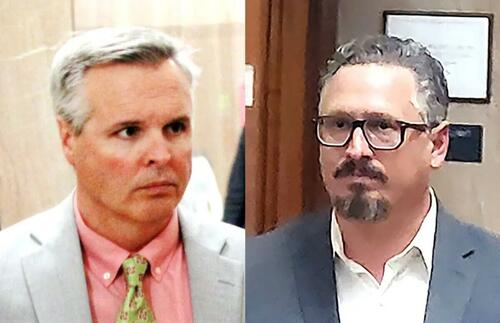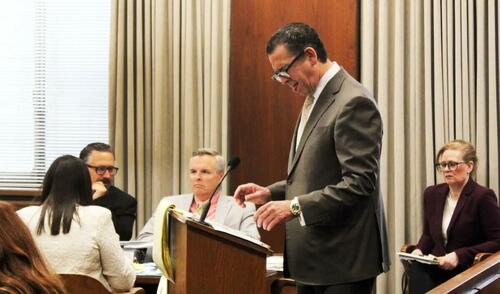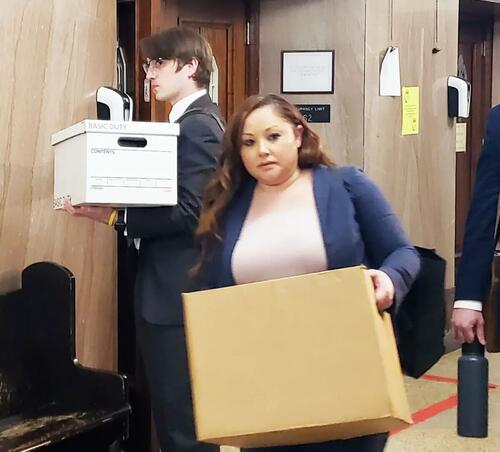
Authored by Michael Clements via The Epoch Times (emphasis ours),
Prosecutors are accusing three men of bilking Oklahoma out of millions of dollars in public school funds through a charter school plan that one of the defendants told a state district court prioritized income.

Lawyers from the Oklahoma Attorney General’s office began outlining their case during preliminary hearings March 25–March 29 in the District Court of Oklahoma County, in Oklahoma City.
Their case is based on an investigation by the Oklahoma State Bureau of Investigation (OSBI) and an investigative audit report released by the State Auditor and Inspector’s office on Oct. 1, 2020.
However, a lawyer for one of the defendants says his client is a legitimate businessman who has become the victim of incompetent state officials running a politically motivated investigation.
David Lee Chaney and Benjamin Scott Harris each face prison time and possibly millions in restitution if convicted of 15 criminal charges for their alleged scheme to defraud the state through Epic Charter Schools.
Joshua Brock, former chief financial officer, has agreed to plead guilty and testify for the state in exchange for 15 years of probation with restitution to be determined.
Slouched in the witness stand of Special Judge Jason Glidewell’s courtroom in the Oklahoma County District Court in Oklahoma City, Mr. Brock testified in a low monotone. He wore the tired, disinterested expression of a man who wants his case to end.
The Cushing native was friends with Mr. Harris and had a background in accounting and business finance. He said that around 2009, Mr. Harris began talking with him about charter schools. Mr. Brock also liked the idea of a public school run like a private school.
“I believe in the concept,” Mr. Brock testified.
In Oklahoma, charter schools are publicly funded and open to any student. A board oversees them and may not charge tuition. Charter schools must comply with open records and open meeting laws.
However, they are exempt from such requirements as collective bargaining and credentialing. Students can be taught online, in brick-and-mortar locations, or a combination of both. Parents and teachers have broad latitude in curriculum, hours, and other aspects of a child’s education.
The Oklahoma Department of Education website states that charter schools receive, “Flexibility in exchange for accountability.”
During a 2011 meeting in an Oklahoma City restaurant, Mr. Brock agreed to be the CFO for EYS and Indoor Air Quality Services (IAQS), a business Messrs. Harris and Chaney operated.
In those early days, IAQS paid Mr. Brock. Later, EYS would contract with Mr. Brock’s company, JAB Consulting.
According to a special investigative audit report released by Oklahoma State Auditor and Inspector Cindy Byrd in October 2020, the trio raked in at least $125 million of the $458 million in government funds disbursed to the school from 2015 to 2020.
Of that, $45.9 million was paid to Epic Youth Services, a for-profit management company the men set up to handle school affairs.
According to the report, EYS had no employees and was controlled entirely by Messrs. Harris, Chaney, and Brock.
EYS, and therefore the three men, controlled a “Student Learning Fund,” through which $79.3 million in public funds flowed, the report stated.
Oklahoma State Bureau of Investigation (OSBI) Special Agent Mark Drummond testified that there may be even more. He said his investigation had found more than 100 accounts that might contain Epic Charter School money.
During preliminary hearings the week of March 25–March 29, 2024, Mr. Brock said EYS had few if any employees and one main objective.
“To minimize costs and maximize profit.”

Ms. Byrd confirmed that some law enforcement agencies are still investigating Epic Charter Schools, though she wouldn’t specify which ones.
She said she is holding on to a second audit report so as not to interfere.
“The second report is pending in the event that it may be needed,” she told The Epoch Times.
According to court records, Mr. Harris founded the non-profit Community Strategies Inc. (CSI) in 2005.
He and Mr. Chaney reportedly set up the for-profit Epic Youth Services (EYS) as the management company for the non-profit Epic Charter Schools. CSI, doing business as Epic Charter Schools, began operating in December 2010.
According to the audit report, funding from the State Department of Education and the federal government went to Epic’s sponsors, who kept 3 percent of sponsorship fees. The remaining 97 percent went to the charter schools through CSI.
The report states that the schools sent 10 percent of the total revenue, including the fees kept by the sponsors, to EYS and money to the Student Learning Fund, which EYS controlled.
Epic Charter’s first sponsor was Graham Public School in Ofuskee County, Oklahoma. Mr. Brock said the small K–12 school was struggling financially and was glad for the cash infusion.
In 2018, Epic split into Epic One-on-One, the online school, and Epic Blended.
Epic Blended is a virtual school that also provides work centers where students can use computers with internet access and receive other types of classroom support.
Rose State College now sponsors Epic Blended, and the Oklahoma Statewide Virtual Charter School Board sponsors Epic One-on-One, an online charter school.
On paper, EYS’s purpose was to handle Epic Charter School’s administrative work and manage its finances. Mr. Brock said that, in reality, EYS had a single purpose.

“The object was to minimize costs, maximize profit,” Mr. Brock testified on March 28.
Mr. Brock said it was the practice to ensure that all invoices added up to the total 10 percent management fee outlined in EYS’s contract. Early on, that was not difficult, as the invoices listed the fee amount.
However, in 2019, HB1395 became the law in Oklahoma. The new law mandated the Oklahoma Cost Accounting System (OCAS), which requires invoices to be itemized using OCAS codes.
Mr. Brock said that rather than lose money by accurately itemizing, he wrote computer code that automatically divided the fee among the same 14 OCAS codes each month.
So, regardless of how much funding Epic received or what EYS’s actual expenses were, the system would produce invoices totaling 10 percent of the revenue received every month.
Jeanice Wynn said she noticed the questionable invoices soon after she started work at Epic.
She was hired as Deputy Superintendent of Finance in 2021, shortly after the audit report was released. She testified that she took the job with some trepidation.
Epic had already been in the news due to a conflict with the Oklahoma Department of Education.
Disputes over enrollment, attendance requirements, and other issues had prompted then-Gov. Mary Fallin requested OSBI to look into the fledgling charter school in 2013.
While Epic prevailed in most of those disputes, rumors continued to fly.
Ms. Wynn testified that she believed her job had been created in response to the audit report. She said some things, like those oddly uniform invoices, caught her attention almost immediately.
She said the same 14 OCAS codes were used each month, and they always added up to 10 percent of Epic’s total revenue from the state.
According to Ms. Wynn, that is unusual at best.
“That doesn’t happen,” she said.
In addition, some of the codes seemed questionable. For example, invoices for the online school included food service.
When asked how much EYS paid to provide food for Epic’s online students, Mr. Brock answered succinctly.
“Not much, zero,” he said.
But, thanks to those invoices, by the time the Epic Charter School Board ended its management agreement with EYS on May 21, 2021, Mr. Harris had made $24.8 million, Mr. Chaney brought in $23 million, and Mr. Brock had received $8.7 million, Brenda Holt, director of the Investigative Audit Division of the State Auditor and Inspector’s office testified.
The Student Learning Fund is marketed as an account for each student to spend up to $1,000 for computers, books, musical instruments and lessons, extracurricular activities, tutoring, and similar education-related purchases.
For each Learning Fund purchase, EYS assessed an $85 service fee.
Ms. Wynn was tasked with addressing the auditors’ concerns over the fund. But, she only had access to money under Epic’s Tax ID number.
EYS controlled the Student Learning Fund, which auditors claimed was public money managed by Epic workers who were state employees.
“I expected [the Learning Fund personnel] to be on the payroll for EYS,” she told the court. (Mr. Brock) was approving (the EYS invoices), then receiving the payment [from Epic],” she said.
The auditors noted this as well.
“As the EYS CFO, Brock appears to be responsible for the submission of EYS’ invoices ... for both the management fees and the Student Learning Fund.
“As the One-on-One and Blended CFO, he oversees the payment of the same invoices. There is no system of checks and balances in place between the related entities,” the audit report reads.
Ms. Holt also testified about how credit cards were used in the Epic Charter School Student Learning Fund. She found the arrangement to be unusual.
“I had never seen that before,” she said.

The Student Learning Fund had two credit cards. A Visa card that was issued to the fund. Each Visa bore the name of the employee authorized to use it. The other was an American Express card issued to IAQS.
Ms. Holt said she learned that IAQS stood for Indoor Air Quality Services, the business owned by Mr. Chaney, who had initially been paid Mr. Brock for his services.
Ms. Holt said Epic Charter School employees made purchases using credit cards. EYS invoiced the purchases, and Epic Charter Schools paid those invoices with Learning Fund money.
She said auditors found approximately $817,000 worth of alleged personal purchases made with that card.
Of this, $748,000 appears to have been spent on purchases by Mr. Chaney and his wife.
The remaining $69,000 in personal purchases was split between two Learning Fund employees.
Ms. Holt said the charges included Southwest Airlines, Stub Hub, Men’s Wearhouse, Starbucks, and political donations, including two $2,700 donations to former Oklahoma Superintendent of Public Instruction Joy Hofmeister, who ran against Gov. Kevin Stitt in 2022.
Ms. Holt said she found that Mr. Chaney repaid $446,000 of those purchases, which left $327,000 for the Learning Fund to cover.
Court records also indicate that Mr. Brock allegedly received more than $1 million in illegal overpayments on a Visa card issued to him and used by the Student Learning Fund.
Ms. Holt said that a claim in the Oct. 21 audit report that EYS lawyers tried to prevent auditors from seeing any of the Learning Fund records was true.
According to the investigative report, auditors didn’t get a clear picture of the Student Learning Fund until they were able to access information OSBI had obtained in its investigation.
“[The State Auditor and Inspector] respects the privacy of private companies but is adamant that the stewardship and management of $79.3 million in state appropriated funds designated for student education should be transparent and the records be made available for audit,” the report reads.
Defense lawyers contend that EYS was a private business, so any money paid to it, including state monies meant for the Student Learning Fund, was private money no longer subject to government oversight.

Joe White, of Oklahoma City, represents Mr. Harris. Mr. White is tall and speaks with a country drawl and self-deprecating manner that belies a man ready to exploit any perceived chink in his opponent’s argument.
In court, he aggressively argued that the Student Learning Fund was money EYS earned, comparing it to a state employee’s paycheck.
“Once you get paid, the state doesn’t get to audit your personal bank account, does it?” he asked Ms. Holt.
According to Ms. Holt, the figures in the audit report are relatively conservative. She said it’s her office’s policy to give the audited parties the benefit of the doubt.
“We always try to err on the side of grace and not overstate any of the numbers,” she told the court.
The auditors claim that the Student Learning Fund was used to benefit more than Oklahoma students and the owners of EYS.
Ms. Wynn testified that in 2018, Mr. Harris told the board that Epic Charter Schools Oklahoma had opened Community Strategies—CA, LLC (CS-CA). CS-CA is the non-profit management company for Next Generation, Inc., doing business as Epic Charter Schools California.
“He informed those present that money had flowed to Epic California. There was discussion at that time about that money being paid back,” Ms. Wynn said.
In response to Mr. White’s question, she said she had seen no evidence that the money had been repaid.
According to the audit report, this resulted in the illegal use of Oklahoma tax money and employees to benefit California taxpayers.

Salesha Wilken is a former investigative reporter. She has worked for the State Auditor and Inspector’s office for the past nine years. She testified to finding evidence that EYS transferred Student Learning Fund money to Community Strategies California to “support expansion of EYS.”
She said it appeared the money was used to help the California operation meet payroll. California Strategies was also used to funnel money to the Panola Public Schools in Oklahoma when that district had a cash shortfall, she said.
According to the audit report, Epic One-on-One employees racked up $242,654.42 in labor between 2017 and 2020 working for CS-CA in California and Panola Public Schools in Oklahoma. Panola Public Schools was not part of Epic at that time.
The report states that none of this money was repaid until auditors began asking questions in 2020.
Auditors also found that $203,000 was transferred directly from the student Learning Fund into an Epic-California bank account at one point.
They have found no evidence that money was ever repaid, the report states.
“It shows that those funds were not being used for the students but were being used to enrich EYS,” Ms. Wilken testified. “EYS is the steward of those funds.”
Defense attorneys denied that any public money was misused.
They said the Student Learning Fund was an account owned by EYS, a private company. They contend that the money in the fund belongs to EYS to be used at EYS’s discretion.
“Private companies can dictate the rules concerning their private funds,” Mr. Chaney’s lawyer, Gary Wood, said.
The resolution to that question will determine more than the legal status of a bank account. When the EYS management contract ended in May 2021, there was approximately $5 million in the Student Learning Fund, which prosecutors say EYS was supposed to return to Epic Charter Schools. Instead, they say, the money was invested in several treasury bill accounts.
That money is now the subject of a lawsuit.
When Epic Charter Schools began operation in 2010, CSI’s board oversaw the work. Soon after, most of the CSI board members resigned and were replaced by Robert Stem, Peter Regan, Doug Scott, and Travis Burkett, the court file states.
EYS Attended Board Meetings
“[The board members] were largely acquaintances of Mr. Harris and or Mr. Chaney,” Mr. Brock testified. Investigators and former board member Douglas Scott said at least one of the defendants was present at most board meetings. However, they differ about the sway they held over the board.
“[Harris and Chaney’s] actions and behaviors were indicative of individuals with great influence over the school and the board.
“The board consistently voted unanimously during meetings, rarely questioning the recommendations given or actions taken by Chaney, Harris, and Chief Financial Officer (CFO) Brock,” the court file reads.
Douglas Scott is an attorney from Tulsa who served on the board from 2010 to 2021. He has known Mr. Chaney since they were both boys. But he denied that he or Mr. Harris unduly influenced the board.
“They attended the meetings,” Mr. Scott testified. “They had a broad range of duties.”
Mr. White said the implication that the board was manipulated ignores their commitment to the charter school.
He said board members were volunteers who helped build the largest public school in Oklahoma, which at its height had an enrollment of 60,000 students.
“And the enrollment kept going up, up, and up, didn’t it?” he asked Mr. Scott.
Mr. Scott agreed, saying that he spent a significant amount of time and resources working on behalf of the schools.
Jimmy Harmon, an assistant attorney general prosecuting the case, told the court that auditors found that board members did benefit from their association with Epic Charter Schools.
He said that former board member Robert Stem’s lobbying firm, Capitol Gains, was awarded a contract from Epic the same day he resigned from the board.
According to Mr. Brock, the lobbying deal netted Capitol Gains $520,000.
Mr. Harmon said Mr. Scott’s brother benefitted as well.
“His brother Greg received tens of thousands of dollars for computer work,” Mr. Harmon said.
Mr. White disputes the audit report’s findings.
He pointed out that Mr. Harris was arrested just five days before Ms. Byrd won her party’s nomination for state auditor and inspector. He doesn’t believe that’s a coincidence.
Ms. Byrd dismisses that contention as grasping at straws.
She says the investigations and audits began long before the 2020 elections and that she doesn’t need any high-profile cases to boost her campaign in an election she said she won by 70 points.
“I just can’t even believe that that’s a good defense,” she said.
Each man is charged with one count of racketeering, six counts of embezzlement, two counts of using a computer system or computer network to execute a scheme to defraud, two counts of presenting false claims to the state, and one count each of acquiring unlawful proceeds, acquiring unlawful proceeds in excess of $50,000, obtaining money by false pretenses, and money laundering.
Preliminary hearings are set to resume in May; no trial date has been set.
Epic Charter Schools and Epic Charter School California are still in operation with a new board and are no longer affiliated with Messrs. Brock, Chaney, or Harris.
Authored by Michael Clements via The Epoch Times (emphasis ours),
Prosecutors are accusing three men of bilking Oklahoma out of millions of dollars in public school funds through a charter school plan that one of the defendants told a state district court prioritized income.

Lawyers from the Oklahoma Attorney General’s office began outlining their case during preliminary hearings March 25–March 29 in the District Court of Oklahoma County, in Oklahoma City.
Their case is based on an investigation by the Oklahoma State Bureau of Investigation (OSBI) and an investigative audit report released by the State Auditor and Inspector’s office on Oct. 1, 2020.
However, a lawyer for one of the defendants says his client is a legitimate businessman who has become the victim of incompetent state officials running a politically motivated investigation.
David Lee Chaney and Benjamin Scott Harris each face prison time and possibly millions in restitution if convicted of 15 criminal charges for their alleged scheme to defraud the state through Epic Charter Schools.
Joshua Brock, former chief financial officer, has agreed to plead guilty and testify for the state in exchange for 15 years of probation with restitution to be determined.
Slouched in the witness stand of Special Judge Jason Glidewell’s courtroom in the Oklahoma County District Court in Oklahoma City, Mr. Brock testified in a low monotone. He wore the tired, disinterested expression of a man who wants his case to end.
The Cushing native was friends with Mr. Harris and had a background in accounting and business finance. He said that around 2009, Mr. Harris began talking with him about charter schools. Mr. Brock also liked the idea of a public school run like a private school.
“I believe in the concept,” Mr. Brock testified.
In Oklahoma, charter schools are publicly funded and open to any student. A board oversees them and may not charge tuition. Charter schools must comply with open records and open meeting laws.
However, they are exempt from such requirements as collective bargaining and credentialing. Students can be taught online, in brick-and-mortar locations, or a combination of both. Parents and teachers have broad latitude in curriculum, hours, and other aspects of a child’s education.
The Oklahoma Department of Education website states that charter schools receive, “Flexibility in exchange for accountability.”
During a 2011 meeting in an Oklahoma City restaurant, Mr. Brock agreed to be the CFO for EYS and Indoor Air Quality Services (IAQS), a business Messrs. Harris and Chaney operated.
In those early days, IAQS paid Mr. Brock. Later, EYS would contract with Mr. Brock’s company, JAB Consulting.
According to a special investigative audit report released by Oklahoma State Auditor and Inspector Cindy Byrd in October 2020, the trio raked in at least $125 million of the $458 million in government funds disbursed to the school from 2015 to 2020.
Of that, $45.9 million was paid to Epic Youth Services, a for-profit management company the men set up to handle school affairs.
According to the report, EYS had no employees and was controlled entirely by Messrs. Harris, Chaney, and Brock.
EYS, and therefore the three men, controlled a “Student Learning Fund,” through which $79.3 million in public funds flowed, the report stated.
Oklahoma State Bureau of Investigation (OSBI) Special Agent Mark Drummond testified that there may be even more. He said his investigation had found more than 100 accounts that might contain Epic Charter School money.
During preliminary hearings the week of March 25–March 29, 2024, Mr. Brock said EYS had few if any employees and one main objective.
“To minimize costs and maximize profit.”

Ms. Byrd confirmed that some law enforcement agencies are still investigating Epic Charter Schools, though she wouldn’t specify which ones.
She said she is holding on to a second audit report so as not to interfere.
“The second report is pending in the event that it may be needed,” she told The Epoch Times.
According to court records, Mr. Harris founded the non-profit Community Strategies Inc. (CSI) in 2005.
He and Mr. Chaney reportedly set up the for-profit Epic Youth Services (EYS) as the management company for the non-profit Epic Charter Schools. CSI, doing business as Epic Charter Schools, began operating in December 2010.
According to the audit report, funding from the State Department of Education and the federal government went to Epic’s sponsors, who kept 3 percent of sponsorship fees. The remaining 97 percent went to the charter schools through CSI.
The report states that the schools sent 10 percent of the total revenue, including the fees kept by the sponsors, to EYS and money to the Student Learning Fund, which EYS controlled.
Epic Charter’s first sponsor was Graham Public School in Ofuskee County, Oklahoma. Mr. Brock said the small K–12 school was struggling financially and was glad for the cash infusion.
In 2018, Epic split into Epic One-on-One, the online school, and Epic Blended.
Epic Blended is a virtual school that also provides work centers where students can use computers with internet access and receive other types of classroom support.
Rose State College now sponsors Epic Blended, and the Oklahoma Statewide Virtual Charter School Board sponsors Epic One-on-One, an online charter school.
On paper, EYS’s purpose was to handle Epic Charter School’s administrative work and manage its finances. Mr. Brock said that, in reality, EYS had a single purpose.

“The object was to minimize costs, maximize profit,” Mr. Brock testified on March 28.
Mr. Brock said it was the practice to ensure that all invoices added up to the total 10 percent management fee outlined in EYS’s contract. Early on, that was not difficult, as the invoices listed the fee amount.
However, in 2019, HB1395 became the law in Oklahoma. The new law mandated the Oklahoma Cost Accounting System (OCAS), which requires invoices to be itemized using OCAS codes.
Mr. Brock said that rather than lose money by accurately itemizing, he wrote computer code that automatically divided the fee among the same 14 OCAS codes each month.
So, regardless of how much funding Epic received or what EYS’s actual expenses were, the system would produce invoices totaling 10 percent of the revenue received every month.
Jeanice Wynn said she noticed the questionable invoices soon after she started work at Epic.
She was hired as Deputy Superintendent of Finance in 2021, shortly after the audit report was released. She testified that she took the job with some trepidation.
Epic had already been in the news due to a conflict with the Oklahoma Department of Education.
Disputes over enrollment, attendance requirements, and other issues had prompted then-Gov. Mary Fallin requested OSBI to look into the fledgling charter school in 2013.
While Epic prevailed in most of those disputes, rumors continued to fly.
Ms. Wynn testified that she believed her job had been created in response to the audit report. She said some things, like those oddly uniform invoices, caught her attention almost immediately.
She said the same 14 OCAS codes were used each month, and they always added up to 10 percent of Epic’s total revenue from the state.
According to Ms. Wynn, that is unusual at best.
“That doesn’t happen,” she said.
In addition, some of the codes seemed questionable. For example, invoices for the online school included food service.
When asked how much EYS paid to provide food for Epic’s online students, Mr. Brock answered succinctly.
“Not much, zero,” he said.
But, thanks to those invoices, by the time the Epic Charter School Board ended its management agreement with EYS on May 21, 2021, Mr. Harris had made $24.8 million, Mr. Chaney brought in $23 million, and Mr. Brock had received $8.7 million, Brenda Holt, director of the Investigative Audit Division of the State Auditor and Inspector’s office testified.
The Student Learning Fund is marketed as an account for each student to spend up to $1,000 for computers, books, musical instruments and lessons, extracurricular activities, tutoring, and similar education-related purchases.
For each Learning Fund purchase, EYS assessed an $85 service fee.
Ms. Wynn was tasked with addressing the auditors’ concerns over the fund. But, she only had access to money under Epic’s Tax ID number.
EYS controlled the Student Learning Fund, which auditors claimed was public money managed by Epic workers who were state employees.
“I expected [the Learning Fund personnel] to be on the payroll for EYS,” she told the court. (Mr. Brock) was approving (the EYS invoices), then receiving the payment [from Epic],” she said.
The auditors noted this as well.
“As the EYS CFO, Brock appears to be responsible for the submission of EYS’ invoices … for both the management fees and the Student Learning Fund.
“As the One-on-One and Blended CFO, he oversees the payment of the same invoices. There is no system of checks and balances in place between the related entities,” the audit report reads.
Ms. Holt also testified about how credit cards were used in the Epic Charter School Student Learning Fund. She found the arrangement to be unusual.
“I had never seen that before,” she said.

The Student Learning Fund had two credit cards. A Visa card that was issued to the fund. Each Visa bore the name of the employee authorized to use it. The other was an American Express card issued to IAQS.
Ms. Holt said she learned that IAQS stood for Indoor Air Quality Services, the business owned by Mr. Chaney, who had initially been paid Mr. Brock for his services.
Ms. Holt said Epic Charter School employees made purchases using credit cards. EYS invoiced the purchases, and Epic Charter Schools paid those invoices with Learning Fund money.
She said auditors found approximately $817,000 worth of alleged personal purchases made with that card.
Of this, $748,000 appears to have been spent on purchases by Mr. Chaney and his wife.
The remaining $69,000 in personal purchases was split between two Learning Fund employees.
Ms. Holt said the charges included Southwest Airlines, Stub Hub, Men’s Wearhouse, Starbucks, and political donations, including two $2,700 donations to former Oklahoma Superintendent of Public Instruction Joy Hofmeister, who ran against Gov. Kevin Stitt in 2022.
Ms. Holt said she found that Mr. Chaney repaid $446,000 of those purchases, which left $327,000 for the Learning Fund to cover.
Court records also indicate that Mr. Brock allegedly received more than $1 million in illegal overpayments on a Visa card issued to him and used by the Student Learning Fund.
Ms. Holt said that a claim in the Oct. 21 audit report that EYS lawyers tried to prevent auditors from seeing any of the Learning Fund records was true.
According to the investigative report, auditors didn’t get a clear picture of the Student Learning Fund until they were able to access information OSBI had obtained in its investigation.
“[The State Auditor and Inspector] respects the privacy of private companies but is adamant that the stewardship and management of $79.3 million in state appropriated funds designated for student education should be transparent and the records be made available for audit,” the report reads.
Defense lawyers contend that EYS was a private business, so any money paid to it, including state monies meant for the Student Learning Fund, was private money no longer subject to government oversight.

Joe White, of Oklahoma City, represents Mr. Harris. Mr. White is tall and speaks with a country drawl and self-deprecating manner that belies a man ready to exploit any perceived chink in his opponent’s argument.
In court, he aggressively argued that the Student Learning Fund was money EYS earned, comparing it to a state employee’s paycheck.
“Once you get paid, the state doesn’t get to audit your personal bank account, does it?” he asked Ms. Holt.
According to Ms. Holt, the figures in the audit report are relatively conservative. She said it’s her office’s policy to give the audited parties the benefit of the doubt.
“We always try to err on the side of grace and not overstate any of the numbers,” she told the court.
The auditors claim that the Student Learning Fund was used to benefit more than Oklahoma students and the owners of EYS.
Ms. Wynn testified that in 2018, Mr. Harris told the board that Epic Charter Schools Oklahoma had opened Community Strategies—CA, LLC (CS-CA). CS-CA is the non-profit management company for Next Generation, Inc., doing business as Epic Charter Schools California.
“He informed those present that money had flowed to Epic California. There was discussion at that time about that money being paid back,” Ms. Wynn said.
In response to Mr. White’s question, she said she had seen no evidence that the money had been repaid.
According to the audit report, this resulted in the illegal use of Oklahoma tax money and employees to benefit California taxpayers.

Salesha Wilken is a former investigative reporter. She has worked for the State Auditor and Inspector’s office for the past nine years. She testified to finding evidence that EYS transferred Student Learning Fund money to Community Strategies California to “support expansion of EYS.”
She said it appeared the money was used to help the California operation meet payroll. California Strategies was also used to funnel money to the Panola Public Schools in Oklahoma when that district had a cash shortfall, she said.
According to the audit report, Epic One-on-One employees racked up $242,654.42 in labor between 2017 and 2020 working for CS-CA in California and Panola Public Schools in Oklahoma. Panola Public Schools was not part of Epic at that time.
The report states that none of this money was repaid until auditors began asking questions in 2020.
Auditors also found that $203,000 was transferred directly from the student Learning Fund into an Epic-California bank account at one point.
They have found no evidence that money was ever repaid, the report states.
“It shows that those funds were not being used for the students but were being used to enrich EYS,” Ms. Wilken testified. “EYS is the steward of those funds.”
Defense attorneys denied that any public money was misused.
They said the Student Learning Fund was an account owned by EYS, a private company. They contend that the money in the fund belongs to EYS to be used at EYS’s discretion.
“Private companies can dictate the rules concerning their private funds,” Mr. Chaney’s lawyer, Gary Wood, said.
The resolution to that question will determine more than the legal status of a bank account. When the EYS management contract ended in May 2021, there was approximately $5 million in the Student Learning Fund, which prosecutors say EYS was supposed to return to Epic Charter Schools. Instead, they say, the money was invested in several treasury bill accounts.
That money is now the subject of a lawsuit.
When Epic Charter Schools began operation in 2010, CSI’s board oversaw the work. Soon after, most of the CSI board members resigned and were replaced by Robert Stem, Peter Regan, Doug Scott, and Travis Burkett, the court file states.
EYS Attended Board Meetings
“[The board members] were largely acquaintances of Mr. Harris and or Mr. Chaney,” Mr. Brock testified. Investigators and former board member Douglas Scott said at least one of the defendants was present at most board meetings. However, they differ about the sway they held over the board.
“[Harris and Chaney’s] actions and behaviors were indicative of individuals with great influence over the school and the board.
“The board consistently voted unanimously during meetings, rarely questioning the recommendations given or actions taken by Chaney, Harris, and Chief Financial Officer (CFO) Brock,” the court file reads.
Douglas Scott is an attorney from Tulsa who served on the board from 2010 to 2021. He has known Mr. Chaney since they were both boys. But he denied that he or Mr. Harris unduly influenced the board.
“They attended the meetings,” Mr. Scott testified. “They had a broad range of duties.”
Mr. White said the implication that the board was manipulated ignores their commitment to the charter school.
He said board members were volunteers who helped build the largest public school in Oklahoma, which at its height had an enrollment of 60,000 students.
“And the enrollment kept going up, up, and up, didn’t it?” he asked Mr. Scott.
Mr. Scott agreed, saying that he spent a significant amount of time and resources working on behalf of the schools.
Jimmy Harmon, an assistant attorney general prosecuting the case, told the court that auditors found that board members did benefit from their association with Epic Charter Schools.
He said that former board member Robert Stem’s lobbying firm, Capitol Gains, was awarded a contract from Epic the same day he resigned from the board.
According to Mr. Brock, the lobbying deal netted Capitol Gains $520,000.
Mr. Harmon said Mr. Scott’s brother benefitted as well.
“His brother Greg received tens of thousands of dollars for computer work,” Mr. Harmon said.
Mr. White disputes the audit report’s findings.
He pointed out that Mr. Harris was arrested just five days before Ms. Byrd won her party’s nomination for state auditor and inspector. He doesn’t believe that’s a coincidence.
Ms. Byrd dismisses that contention as grasping at straws.
She says the investigations and audits began long before the 2020 elections and that she doesn’t need any high-profile cases to boost her campaign in an election she said she won by 70 points.
“I just can’t even believe that that’s a good defense,” she said.
Each man is charged with one count of racketeering, six counts of embezzlement, two counts of using a computer system or computer network to execute a scheme to defraud, two counts of presenting false claims to the state, and one count each of acquiring unlawful proceeds, acquiring unlawful proceeds in excess of $50,000, obtaining money by false pretenses, and money laundering.
Preliminary hearings are set to resume in May; no trial date has been set.
Epic Charter Schools and Epic Charter School California are still in operation with a new board and are no longer affiliated with Messrs. Brock, Chaney, or Harris.
Loading…





